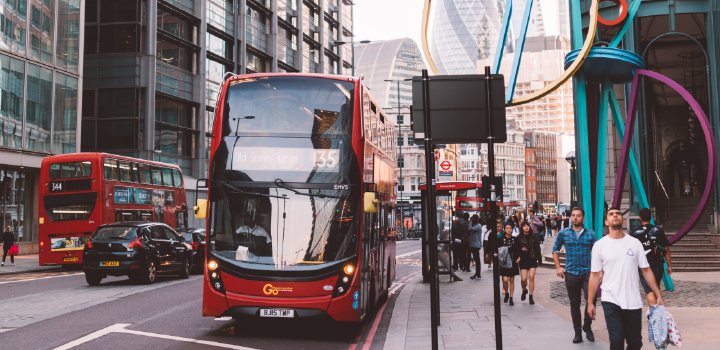How to Reduce and Offset Your Individual Carbon Emissions
Around 40% of the UK’s carbon emissions come from households, with the average person’s carbon footprint being around 10 tonnes per year. That’s enough to each fill over two hot air balloons. If everyone committed to reducing carbon emissions, that could make a huge difference to the environment.

As climate change gains momentum, weather conditions become more extreme. This often leads to increased energy consumption – further accelerating the problem. As an example, there was a 2.8% increase in UK residential emissions from 2017 to 2018. This thought to be as a result of a much colder winter and record-breaking snowy conditions dubbed “The Beast from the East”. In short, the longer we allow carbon emissions to increase, the harder it will be to reduce the emissions in the long run.
Extreme temperatures aren’t just affecting us here in the UK, either. Changing weather patterns have had catastrophic impacts all around the world. Recent bushfires in Australia have devastated ecosystems to the point of destruction. Over 1 billion animals are thought to have died as a result, leaving Koalas vulnerable to extinction. Similarly, fires in the Amazon rainforest in the summer of 2019 left 2,240,000 acres of land burned to ash. California in 2019 lost 259,823 acres.
Acting now on climate change is not only important – it’s critical to the future of all life on earth.
We’ve outlined a few simple changes we can all make at home to reduce our carbon emissions, and how to offset the individual emissions we do produce.
Reducing Individual Carbon Emissions
There are many ways to reduce environmental impacts, and this is something we have talked about in our blog quite frequently in the past. In addition to the ways we have previously mentioned, the simple changes below can reduce individual carbon emissions significantly.
The main areas we can reduce our carbon emissions are by changing how we heat our homes, using renewables, our energy efficiency, how we travel, the food we eat and where that food comes from, and how we dispose of waste.
Heating the Home
The average UK household emits 2.7 tonnes of CO2 each year just from heating the home. This makes up about 30% of our individual carbon emissions. But there are ways to get that energy usage down. 1 in 20 homes that use gas heating could join a heat network. This would save around 2 tonnes of CO2 per year per home. Homes using oil and electric heating could also make the switch to a heat pump. This would save 3.2 tonnes and 0.8 tonnes of CO2 per year respectively.
Using Renewable Energy
Switching to a highly efficient home powered by renewable energy could make a big difference to our individual carbon emissions. You don’t have to shell out thousands of pounds on solar panels to get a clean energy home these days, either. Renewable energy providers are readily available in most parts of the UK, and many renewable providers tend to sit at the cheaper end of the market.
Energy Efficiency and Usage
Rethinking our appliance habits and becoming more energy efficient could also make a big difference. As an example, line-drying clothes rather than using a tumble dryer could save a lot of energy. Running a tumble dryer for an hour uses around 4.5kWh of energy. This is the hourly equivalent of powering one-hundred 50-watt bulbs! By changing how we think about our energy usage, our carbon footprints could be reduced significantly.
Changing Travelling Habits
Another huge contributor to personal carbon emissions is the way we travel.
The best way to reduce our transport emissions is to walk or cycle where possible. If you’re lucky enough to live close by to your local shops or place of work, why not give it a try one or two days a week? This small change will be of benefit to the planet and could help you feel great too! Exercise, even in short bursts, increases the body’s endorphins – our natural feel-good chemicals. This means you can help the environment, and feel great about it too!
Driving electric or hybrid cars is a great way to reduce carbon footprints too, and something that will eventually be inevitable for the majority of road users. The sale of new petrol and diesel cars is set to be banned in the UK by 2040. To many, this goal may seem unrealistic, given the current car market available. Fortunately, more electric and hybrid vehicles are becoming available to UK buyers, and manufacturers seem to be committing to developing their electric models. Second-hand electric cars can also be found for just a few thousand pounds online. Finance options are usually available too, making it easier for consumers to drive an eco-friendly car.
Another great way to reduce vehicle emissions is by using public transport and car-sharing.

Reducing Meat Consumption
Carbon emissions from worldwide livestock farming have devastating effects on the planet. The Guardian reported in December 2019 that the livestock industry contributes as much greenhouse gas emissions as every car, truck, and aeroplane in the world combined. Remember, methane emissions aren’t the only contributor in this industry. There is deforestation to create space for livestock, deforestation to farm the soybeans and grains that feed the livestock, fertiliser production for feed crops, and the transport of meat worldwide.
Eating a little less red meat or adopting a flexitarian diet could halve our diet-related carbon emissions. If you’re thinking of taking the plunge into veganism, you could see your diet-related carbon emissions decrease 70% lower than the UK average.
Buying Local and Seasonal Produce
Much of the food eaten in the UK is flown in from overseas. This includes everything from fruits to frozen fish. Eating seasonal, local food could reduce the carbon footprint of your food. Several brands have recognised that information about the carbon footprint of food items is becoming increasingly important to consumers. Many brands, including vegetarian food brand Quorn, are now including carbon labelling on their products as a result.
Offsetting Individual Carbon Emissions
If reducing your carbon emissions wasn’t enough for you, there’s also carbon offsetting. There are a whole host of organisations and schemes that provide individuals with the opportunity to offset personal emissions. Click on the links below to learn more.
Team Trees
Team Trees is a global fundraiser to plant 20 million trees across the globe. For every dollar pledged, a tree is planted. You can learn more about Team Trees by visiting: https://teamtrees.org/
Trees for Life
Trees for Life help the environment by offering their tree planting services as a gift idea. Everyone who purchases a tree planting gift will receive a personalised gift certificate. There is also the option to invest in a whole grove of trees, all of which are planted in the Scottish Highlands. They also use the new woodlands to aid the conservation of red squirrels. They do this by carefully capturing the squirrels from their strongholds in other regions and introducing them to new environments. You can learn more about Trees for Life here: https://treesforlife.org.uk/support/plant-a-tree/
World Land Trust
The World Land Trust, whose patrons include Sir David Attenborough and Chris Packham, is slightly different from the offsetting companies we’ve mentioned already. Their online carbon calculator can help calculate the exact carbon footprints of individual flights, transport, and households, with the option of offsetting those exact emissions or a fixed amount. Learn more about the World Land Trust here: https://www.worldlandtrust.org/carbon-calculator/individual/
Ecosia
Ecosia, the search engine that uses profits to plant trees, is a company we have written about before. At the time of writing, Ecosia has planted over 82 million trees around the world since 2009. Learn more here: https://www.ecosia.org/
Eden Reforestation Projects
For larger offsets, the Eden Reforestation Project might be a good choice. The Eden Reforestation Projects can offer their donors data on carbon offsetting for mangroves sites per hectare. They plant trees in the areas of the world where deforestation has had the worst effects, including Madagascar, Haiti, Indonesia, Mozambique, Kenya and Nepal. You can learn more here: https://edenprojects.org/
Disappointingly, many of the world’s top polluters are taking no action to reduce their carbon emissions or invest in renewables. That makes individual efforts and the efforts of other businesses even more critical.
At Shred Station, protecting the environment has always been one of our top priorities. We are a CarbonNeutral® certified company and before our official certification, we had already taken many steps to reduce our carbon footprint. If you would like to know more about our environmental commitments, get in touch via our general enquiries form.
Shred Station is not affiliated with any of the companies or sources mentioned in this article.
Sign up to our newsletter here to be alerted about new blog articles, data protection advice, and Shred Station news.
